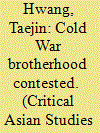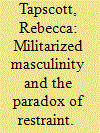|
|
|
Sort Order |
|
|
|
Items / Page
|
|
|
|
|
|
|
| Srl | Item |
| 1 |
ID:
164690


|
|
|
|
|
| Summary/Abstract |
As the largest contingent of Americans in postwar South Korea, the G.I. best represented the United States’ Cold War objectives. Their deployment was an emblem of hard power containment, but the G.I. also embodied soft power integration, and through both, G.I.s helped to promote Pax Americana. This article focuses on the militarized masculinity of these ambassadors of America and their people-to-people diplomacy in South Korea between 1954 and 1966. These American G.I.s constructed their militarized masculinity vis-à-vis the Korean male Other, their “lesser” counterparts – the hapless houseboy, the inferior partner soldier, and the menacing slicky boy. At the same time, this liberal imperialism did not go uncontested. Violent imaginaries of the American G.I. from the borderlands were used by Koreans to demand a new bilateral framework – the Status of Forces Agreement in 1966 – to replace the outmoded wartime extraterritorial jurisdiction wielded by the American military after cessation of hostilities on the Korean peninsula in 1953. The militarized masculinity practiced in everyday encounters, thus, became the basis of a critique of American liberal imperialism in one of the United States closest Cold War “brother” nations.
|
|
|
|
|
|
|
|
|
|
|
|
|
|
|
|
| 2 |
ID:
178117


|
|
|
|
|
| Summary/Abstract |
The twenty-first century is marked by the rise of new forms of authoritarianism, many of which are characterized by the ‘paradox of restraint’, in which reforms compliant with the rule of law are used to unshackle the ruler's arbitrary power. Despite a proliferation of scholarly studies on this topic, we still have limited understanding of how national-level authoritarian power reaches ordinary citizens in these contexts. This article identifies the performance of militarized masculinities as an understudied mechanism that does so. It offers two main contributions: first, it highlights how performances of militarized masculinities enact the paradox of restraint through gendered idioms, thereby magnifying the ambiguities of modern authoritarianism and diffusing them at a local level. Second, it recasts the conceptual utility of militarized masculinities, showing that the concept's inherent tensions between ordered discipline and unaccountable violence produce and project authoritarian power, giving militarized masculinities special potency as a mode of social discipline in these contexts. The article draws on feminist International Relations, employing grounded ethnographic research to illustrate how national-level power circulates locally. To do so, it first illustrates the relationship between the paradox of restraint and militarized masculinities using the cases of Putin's Russia and Duterte's Philippines. It then turns to an in-depth case study of a local dispute between soldiers and civilians in Museveni's Uganda to trace how gendered local encounters facilitate the transmission of national-level authoritarian power into the lives of ordinary people.
|
|
|
|
|
|
|
|
|
|
|
|
|
|
|
|
|
|
|
|
|